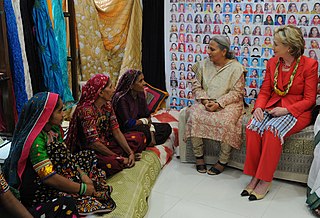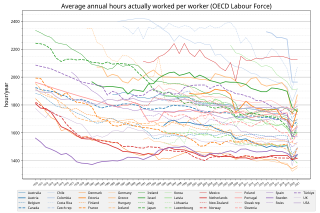
An informal economy is the part of any economy that is neither taxed nor monitored by any form of government. Although the informal sector makes up a significant portion of the economies in developing countries, it is sometimes stigmatized as troublesome and unmanageable. However, the informal sector provides critical economic opportunities for the poor and has been expanding rapidly since the 1960s. Integrating the informal economy into the formal sector is an important policy challenge.

Trade unions in India are registered and file annual returns under the Trade Union Act (1926). Statistics on trade unions are collected annually by the Labour Bureau of the Ministry of Labour, Government of India. According to the latest data released for 2012, there were 16,154 trade unions with a combined membership of 9.18 million, based on returns from 15 states out of a total of 28 states and 9 union territories. The trade union movement in India is largely divided along political lines and follows a pre-Independence pattern of overlapping interactions between political parties and unions. The net result of this system is debated, as it has both advantages and disadvantages. According to data submitted by various trade unions to the Ministry of Labour and Employment as part of a survey, INTUC, with a combined membership of 33.3 million, emerged as the largest trade union in India as of 2013.

Self-Employed Women's Association (SEWA), meaning "service" in several Indian languages, is a trade union based in Ahmedabad, India, that promotes the rights of low-income, independently employed female workers. Nearly 2 million workers are members of the Self-Employed Women’s Association across eight states in India. Self-employed women are defined as those who do not have a fixed employer-employee relationship and do not receive a fixed salary and social protection like that of formally-employed workers and therefore have a more precarious income and life. SEWA organises around the goal of full employment in which a woman secures work, income, food, and social security like health care, child care, insurance, pension and shelter. The principles behind accomplishing these goals are struggle and development, meaning negotiating with stakeholders and providing services, respectively.
The social economy is formed by a rich diversity of enterprises and organisations, such as cooperatives, mutuals, associations, foundations, social enterprises and paritarian institutions, sharing common values and features:

Decent work is employment that "respects the fundamental rights of the human person as well as the rights of workers in terms of conditions of work safety and remuneration. ... respect for the physical and mental integrity of the worker in the exercise of their employment."
Ruth Manorama is a Dalit social activist from Bangalore, India who fights for Dalit women's rights, the rights of domestic workers and those in the unorganized labour sector, as well as urban slum dwellers. In 2006, she was awarded the Right Livelihood Award.

Labour in India refers to employment in the economy of India. In 2020, there were around 476.67 million workers in India, the second largest after China. Out of which, agriculture industry consist of 41.19%, industry sector consist of 26.18% and service sector consist 32.33% of total labour force. Of these over 94 percent work in unincorporated, unorganised enterprises ranging from pushcart vendors to home-based diamond and gem polishing operations. The organised sector includes workers employed by the government, state-owned enterprises and private sector enterprises. In 2008, the organised sector employed 27.5 million workers, of which 17.3 million worked for government or government owned entities.

The All India United Trade Union Centre (AIUTUC), formerly known as United Trade Union Centre or UTUC-LS, is a Central Trade Union Organisation in India and the labour wing of the Socialist Unity Centre of India (Communist). Presently its activities are spread over 19 states. The organisation claims to have 600 affiliated unions, comprising an individual membership of over two million. It is the 6th largest trade union in India. According to provisional statistics from the Ministry of Labour, UTUC-LS had a membership of 1,368,535 in 2002.

The Ministry of Labour & Employment is one of the oldest and most important Ministries of the Government of India. This is an India's federal ministry which is responsible for enforcement of labour laws in general and legislations related to a worker's social security. The Ministry aims to create a healthy work environment for higher production and productivity and to develop and coordinate vocational skill training and employment. However, Skill Development responsibilities, such as Industrial Training and Apprenticeship responsibilities were transferred to the Ministry of Skill Development and Entrepreneurship from 9 November 2014. The Ministry launched the National Career Service portal on 20 July 2015 to help bridge the gap between job providers and job seekers.
The Global Labour University (GLU) is an international network of universities, trade unions, NGOs and the International Labour Organisation. It was initiated in 2002 and offers master's programs, academic certificate programs and Massive Open Online Courses (MOOC) on sustainable development, social justice, international labour standards and trade/labour unions, economic policies and global institutions.

Indian labour law refers to law regulating labour in India. Traditionally, the Indian government at the federal and state levels has sought to ensure a high degree of protection for workers, but in practice, this differs due to the form of government and because labour is a subject in the concurrent list of the Indian Constitution. The Minimum Wages Act 1948 requires companies to pay the minimum wage set by the government alongside limiting working weeks to 40 hours. Overtime is strongly discouraged with the premium on overtime being 100% of the total wage. The Payment of Wages Act 1936 mandates the payment of wages on time on the last working day of every month via bank transfer or postal service. The Factories Act 1948 and the Shops and Establishment Act 1960 mandate 18 working days of fully paid vacation or earned leaves and 7 casual leaves each year to each employee, with an additional 7 fully paid sick days. The Maternity Benefit (Amendment) Act, 2017 gives female employees of every company the right to take 6 months' worth of fully paid maternity leave. It also provides for 6 weeks worth of paid leaves in case of miscarriage or medical termination of pregnancy. The Employees' Provident Fund Organisation and the Employees' State Insurance, governed by statutory acts provide workers with necessary social security for retirement benefits and medical and unemployment benefits respectively. Workers entitled to be covered under the Employees' State Insurance are also entitled to 90 days worth of paid medical leaves. A contract of employment can always provide for more rights than the statutory minimum set rights. The Indian parliament passed four labour codes in the 2019 and 2020 sessions. These four codes will consolidate 44 existing labour laws. They are: The Industrial Relations Code 2020, The Code on Social Security 2020, The Occupational Safety, Health and Working Conditions Code, 2020 and The Code on Wages 2019. Despite having one of the longest working hours, India has one of the lowest workforce productivity levels in the world.

A significant proportion of children in India are engaged in child labour. In 2011, the national census of India found that the total number of child labourers, aged [5–14], to be at 10.12 million, out of the total of 259.64 million children in that age group. The child labour problem is not unique to India; worldwide, about 217 million children work, many full-time.

Mirai Chatterjee is a leader of the Self-Employed Women's Association, SEWA (India). She joined SEWA in 1984 and was its General Secretary after its Founder, Ela Bhatt.
The Confederation of Free Trade Unions of India is a trade union confederation in India. N. Kanaka Rao is the general secretary of CFTUI. CFTUI became a full member of the World Confederation of Labour in 1999. In 2003 the then CFTUI president Ashok Kumar Trivedi was assassinated.
Renana Jhabvala is an Indian social worker based in Ahmedabad, India, who has been active for decades in organising women into organisations and trade unions in India, and has been extensively involved in policy issues relating to poor women and the informal economy. She is best known for her long association with the Self-Employed Women's Association (SEWA), India, and for her writings on issues of women in the informal economy.
Statistics on unemployment in India had traditionally been collected, compiled and disseminated once every ten years by the Ministry of Labour and Employment (MLE), primarily from sample studies conducted by the National Sample Survey Office. Other than these 5-year sample studies, India had historically not collected monthly, quarterly or yearly nationwide employment and unemployment statistics on a routine basis. In 2016, the Centre for Monitoring Indian Economy, a non-governmental entity based in Mumbai, started sampling and publishing monthly unemployment in India statistics. Despite having one of the longest working hours, India has one of the lowest workforce productivity levels in the world. Economists often say that due to structural economic problems, India is experiencing jobless economic growth.

Reema Nanavaty is an Indian developmental worker based in Ahmedabad, India. She has been active for three decades in organising women into co-operative organisations, enterprises and trade unions in India. She is the director of SEWA and is credited for building women's livelihoods and enterprises within eighteen states in India as well as in neighbouring countries such as Afghanistan, Sri Lanka, Nepal and Bhutan.
Unorganised Workers' Identification Number or UWIN is a proposed unique number to be issued as identity proof to unorganised workers in India.
The Home-Based Women Worker's Federation (HBWWF) is a trade union federation of home-based female workers in Pakistan. It is the first-ever all-women-run trade union for informal workers in the country. The Federations focus is on addressing class struggles and the economic exploitation of workers.










